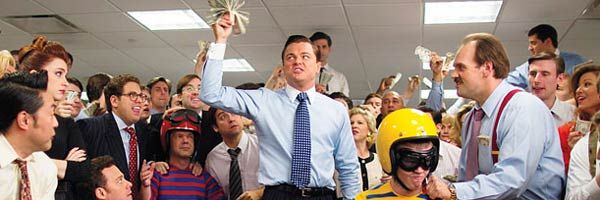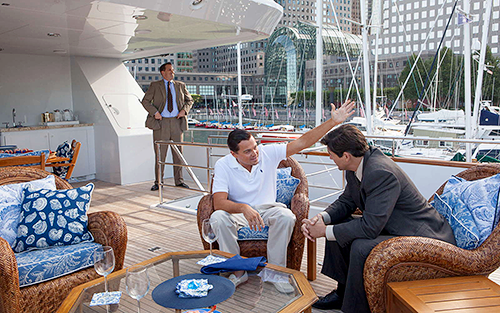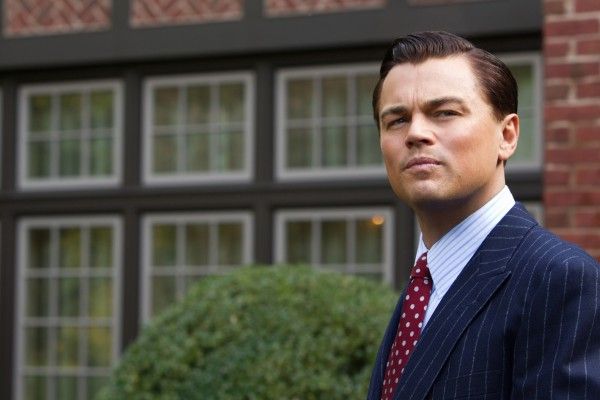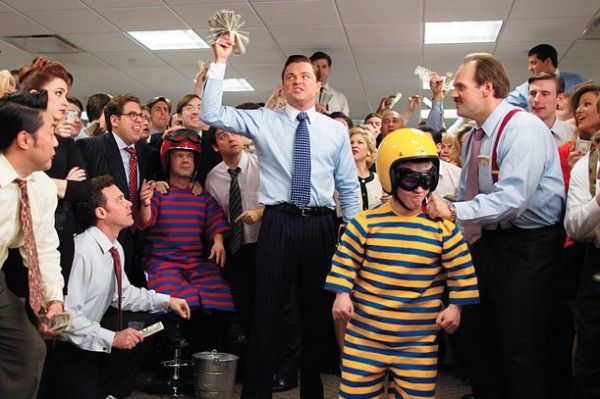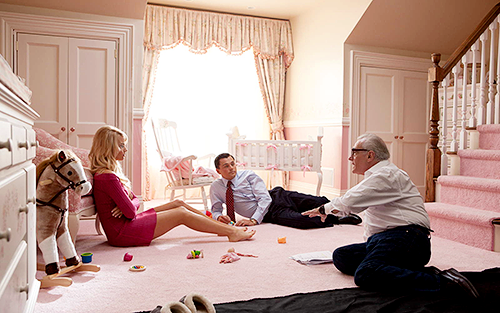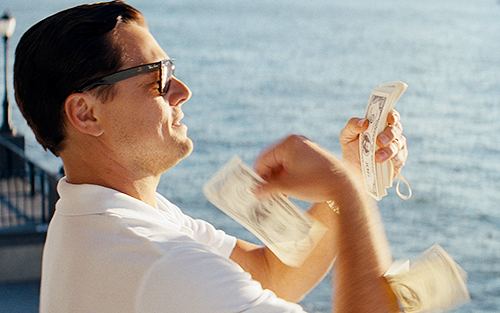It isn’t easy getting a movie made, even for guys like Leonardo DiCaprio and Martin Scorsese. Then again, considering the duo was out to make a movie about a notorious stockbroker with an insatiable sexual drive, obsessive lust for drugs and habit of indulging in highly debauch activities, it is somewhat understandable that studios were hesitant to bring Jordan Belfort’s story to screen.The Wolf of Wall Street covers Belfort’s (DiCaprio) rise in the stockbroking realm in the 1990s. He walks in hungry for money, but strives to attain it honestly. However, the instant he gets a taste of life with the big bucks, it flips a switch and he’s got no problem throwing all of his morals out the window in exchange for enormous paychecks, an endless supply of Quaaludes and the ability to keep his firm on top, even if he has to scam his clients to make it happen. Hit the jump for more. 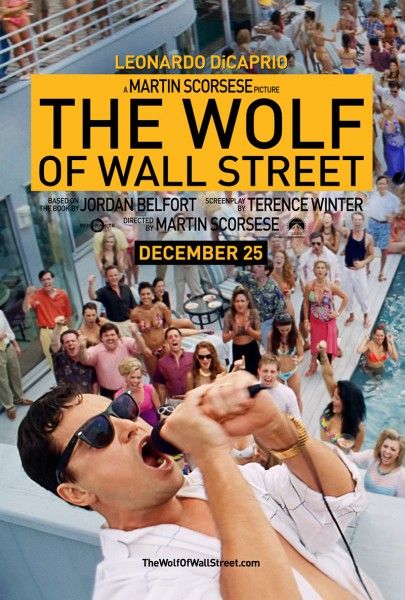 To ring in The Wolf of Wall Street’s Christmas Day debut, DiCaprio and Scorsese as well as Rob Reiner who plays Belfort’s father, Kyle Chandler who steps in as the FBI agent trying to bring Belfort down, writer Terence Winter, producer Emma Tillinger Koskoff, and the guys who took the plunge and gave the project a chance, Red Granit’s Joey McFarland and Riza Aziz, hit the press circuit in New York City. The gang talked about finding the material, financing the production, the soon-to-be infamous Quaalude overdose scene and loads more, and you can catch it all for yourself in the press conference transcription below.Question: This is the fifth film that Martin Scorsese and Leonardo DiCaprio have done together. It’s the second film on which Leonardo has served as a producer. We know that frequently in Scorsese’s career, there have been projects that have been initiated by the actors rather than himself. In the cases of Raging Bull and King of Comedy, those are projects that were really pushed by Robert DeNiro. And in the case of Wolf of Wall Street, this is material that was discovered by Leonard DiCaprio and developed with Martin Scorsese. Can you two talk about the development of the movie?LEONARDO DIPCAPRIO: About six years ago, I picked up this novel by Jordan Belfort, which was a fascinating read simply because I felt like his biography was a reflection of everything that's wrong in today's society. This hedonistic lifestyle, this time period in Wall Street's history where Jordan basically gave into every carnal indulgence possible and was obsessed with greed and obsessed with himself essentially. He was so unflinching in his account of this time period and so honest and so unapologetic in this biography, I was compelled to play this character for a long period of time. We almost got the financing during Shutter Island and the film fell apart, but I was obsessed with having Marty direct this film. Terry Winter wrote an incredible screenplay that I think was really catered to Marty's strengths and his style, and so it was a long waiting period to get this film financed and finally, our friends here at Red Granite said, ‘Look, we want to take a chance on this film. We want it to be a grand American epic of greed and pull no punches, push the envelope, and go the distance with it.’ So I re-approached it and brought it back to Marty and said, ‘Look, we really don't get opportunities like this very often. These things really don't come out of the studio system.’ And thankfully he agreed to do the film again and here we are.Â
To ring in The Wolf of Wall Street’s Christmas Day debut, DiCaprio and Scorsese as well as Rob Reiner who plays Belfort’s father, Kyle Chandler who steps in as the FBI agent trying to bring Belfort down, writer Terence Winter, producer Emma Tillinger Koskoff, and the guys who took the plunge and gave the project a chance, Red Granit’s Joey McFarland and Riza Aziz, hit the press circuit in New York City. The gang talked about finding the material, financing the production, the soon-to-be infamous Quaalude overdose scene and loads more, and you can catch it all for yourself in the press conference transcription below.Question: This is the fifth film that Martin Scorsese and Leonardo DiCaprio have done together. It’s the second film on which Leonardo has served as a producer. We know that frequently in Scorsese’s career, there have been projects that have been initiated by the actors rather than himself. In the cases of Raging Bull and King of Comedy, those are projects that were really pushed by Robert DeNiro. And in the case of Wolf of Wall Street, this is material that was discovered by Leonard DiCaprio and developed with Martin Scorsese. Can you two talk about the development of the movie?LEONARDO DIPCAPRIO: About six years ago, I picked up this novel by Jordan Belfort, which was a fascinating read simply because I felt like his biography was a reflection of everything that's wrong in today's society. This hedonistic lifestyle, this time period in Wall Street's history where Jordan basically gave into every carnal indulgence possible and was obsessed with greed and obsessed with himself essentially. He was so unflinching in his account of this time period and so honest and so unapologetic in this biography, I was compelled to play this character for a long period of time. We almost got the financing during Shutter Island and the film fell apart, but I was obsessed with having Marty direct this film. Terry Winter wrote an incredible screenplay that I think was really catered to Marty's strengths and his style, and so it was a long waiting period to get this film financed and finally, our friends here at Red Granite said, ‘Look, we want to take a chance on this film. We want it to be a grand American epic of greed and pull no punches, push the envelope, and go the distance with it.’ So I re-approached it and brought it back to Marty and said, ‘Look, we really don't get opportunities like this very often. These things really don't come out of the studio system.’ And thankfully he agreed to do the film again and here we are. 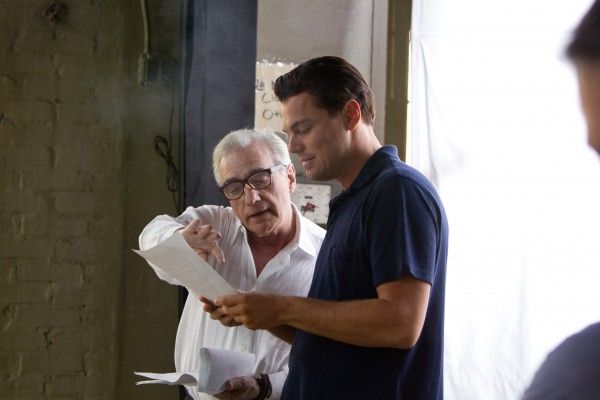 MARTIN SCORSESE: I came into it I think when [Leonardo] gave me the script and then I met Terry and the meeting was about coming up with a television series, which became Boardwalk Empire. [Laughs] But in any event, I read the script and as in many, many times for me, when something is given to me by other people, I don’t necessarily respond to it right away. King of Comedy was 10 years before I was able to come around to it. Raging Bull took six years, seven. I have to find my own way with it, I think. I had in mind to do another film, but we had just finished Departed and that’s when we tried to get the financing of The Wolf of Wall Street and we found a lot of resistance from the studios for that. And I wonder having gone through Departed and having gone through some tougher films, the issue is it worth fighting that process because it’s all about fighting that, unfortunately. It isn’t about good people, bad people. It’s about what they need, what we want to do, what we could deliver for the market place that still we feel is strong with the kind of work we do and could you go through it again. It may not be worth it. It just isn’t at a certain time in your life. And so, at the same time, the market came apart, September 2008, and we decided to do Shutter Island. And after that, [it] came back again, came back again, but I owed Hugo. I wanted to do Hugo. The reasons why I wanted to do Hugo are personal. And after Hugo is when we finally pulled it all together. As I said, the opportunity was back and I thought I found a way that I could approach the material in a different perspective from my other films. Terry, do you want to talk about writing the script?TERENCE WINTER: I read the book in galley form somewhere in 2007. Read it in one sitting. I just could not put it down. I couldn’t believe that what I was reading was actually a true story about a person who actually was still alive at the end of it. [Laughs] Just hilarious. Leo came on board. I had the luxury of being able to then proceed to write the script with Leo’s voice in my head, knowing that, god willing, Marty would also be directing it. I set about the research process. I met with Jordan several times – lunches, dinners, had dinner with his parents who are absolutely lovely, his ex-wife, spoke to the FBI agent who arrested him who assured me that every single thing in that book was true, which was even more incredible to me. I went out to Stratton Oakmont, his house, I actually had Jordan come in to CAA and give one of those incredible speeches to a room full of assistants to see him actually do it, which was pretty incredible. And I think the early conversations about the writing were that I really wanted to preserve Jordan’s voice. The whole idea of his observations about things, the various stages of being high, that sort of thing, is it didn’t necessarily lend itself to dialogue, but were really incredible and fascinating and compelling, and we had had some conversations about maybe approaching the script in that style where you’d actually hear Jordan’s observations and once I had the license to go do that, I wrote the script and Marty and Leo took it from there.Â
MARTIN SCORSESE: I came into it I think when [Leonardo] gave me the script and then I met Terry and the meeting was about coming up with a television series, which became Boardwalk Empire. [Laughs] But in any event, I read the script and as in many, many times for me, when something is given to me by other people, I don’t necessarily respond to it right away. King of Comedy was 10 years before I was able to come around to it. Raging Bull took six years, seven. I have to find my own way with it, I think. I had in mind to do another film, but we had just finished Departed and that’s when we tried to get the financing of The Wolf of Wall Street and we found a lot of resistance from the studios for that. And I wonder having gone through Departed and having gone through some tougher films, the issue is it worth fighting that process because it’s all about fighting that, unfortunately. It isn’t about good people, bad people. It’s about what they need, what we want to do, what we could deliver for the market place that still we feel is strong with the kind of work we do and could you go through it again. It may not be worth it. It just isn’t at a certain time in your life. And so, at the same time, the market came apart, September 2008, and we decided to do Shutter Island. And after that, [it] came back again, came back again, but I owed Hugo. I wanted to do Hugo. The reasons why I wanted to do Hugo are personal. And after Hugo is when we finally pulled it all together. As I said, the opportunity was back and I thought I found a way that I could approach the material in a different perspective from my other films. Terry, do you want to talk about writing the script?TERENCE WINTER: I read the book in galley form somewhere in 2007. Read it in one sitting. I just could not put it down. I couldn’t believe that what I was reading was actually a true story about a person who actually was still alive at the end of it. [Laughs] Just hilarious. Leo came on board. I had the luxury of being able to then proceed to write the script with Leo’s voice in my head, knowing that, god willing, Marty would also be directing it. I set about the research process. I met with Jordan several times – lunches, dinners, had dinner with his parents who are absolutely lovely, his ex-wife, spoke to the FBI agent who arrested him who assured me that every single thing in that book was true, which was even more incredible to me. I went out to Stratton Oakmont, his house, I actually had Jordan come in to CAA and give one of those incredible speeches to a room full of assistants to see him actually do it, which was pretty incredible. And I think the early conversations about the writing were that I really wanted to preserve Jordan’s voice. The whole idea of his observations about things, the various stages of being high, that sort of thing, is it didn’t necessarily lend itself to dialogue, but were really incredible and fascinating and compelling, and we had had some conversations about maybe approaching the script in that style where you’d actually hear Jordan’s observations and once I had the license to go do that, I wrote the script and Marty and Leo took it from there. 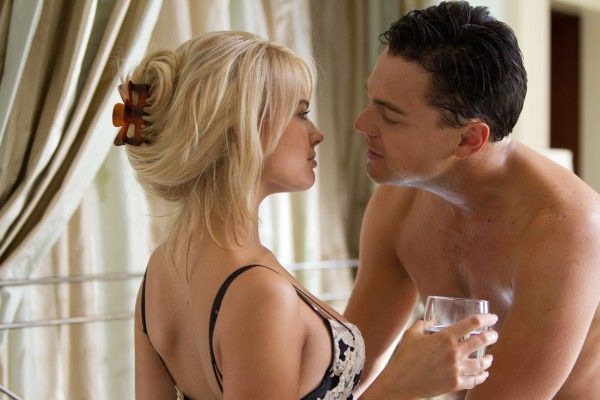 Let’s talk to the producers about putting together the financing, getting this movie going, the process of shooting and everything. JOEY MCFARLAND: First and foremost, Riza and I read the book around the time that it first started with Leo and we watched it collapse and our relationship with Leo was pretty strong through our investors and different circles, and he had always said it was one of the most compelling characters he had ever read and it was at the top of his list of projects that he wanted to see get made. So we dove in. We went and met with Jordan who at the time had taken the rights back from Warner Bros. because they had reverted. He was very hesitant about giving them up because the movie had died and had been on the shelf for so long. He wanted to be make sure that the next people who took it over were actually gonna see it through. So it was a very, very tough decision for him and it took a significant amount of meetings and a lot of trust, and it wasn’t about the purchase, it wasn’t about the money; it was about getting the project made and we assured him that as a new company, this was our springboard into what we saw our place in Hollywood. It was a movie that we feel didn’t belong in a studio because of the way we hoped Marty and Leo would push the envelope. Little did we know how far they would push it, [laughs] but that’s a whole ‘nother story, but we love it. And so he took a chance on us, we took over the underlying rights and then circled back to Warner Bros. and got into the negotiations of the actual screenplay because it was living on the shelf in there and as everyone knows, it’s not easy to extract a script from a studio because I think the only thing worse than not making the film is watching someone else make a film and it go on to be extremely successful and they are the ones that let it go. But ultimately, they did not want to stand in the way of Leo and Marty, they valued their relationships, they blessed the project and we were off to the races. Leo finally was able to introduce Riza and I to Marty, actually at the premiere of Hugo I think was the first meeting. We met you, you had took the time to give us a chance and, financing aside, these guys believed in us as much as we believed in them. It was a huge opportunity and we couldn’t be happier to have that opportunity. Riza and I, we’re successful in gaining the financing behind us, we have a team of investors overseas that value our taste in material and the belief in our ability to execute and really, we were off to the races. Once these guys said yes, it was one fast ride. They wasted no time, Leo was finishing Django at the time. I believe you came off three films, back to back to back, and this was a very, very challenging movie. I think we shot 87, 88 days and Leo probably shot 86 of them and of course Marty did as well. In New York, not easy. But luckily we had miss Emma here who was there just greasing the wheels along the way and making sure it was a flawless, smooth production and getting these guys everything they needed.Â
Let’s talk to the producers about putting together the financing, getting this movie going, the process of shooting and everything. JOEY MCFARLAND: First and foremost, Riza and I read the book around the time that it first started with Leo and we watched it collapse and our relationship with Leo was pretty strong through our investors and different circles, and he had always said it was one of the most compelling characters he had ever read and it was at the top of his list of projects that he wanted to see get made. So we dove in. We went and met with Jordan who at the time had taken the rights back from Warner Bros. because they had reverted. He was very hesitant about giving them up because the movie had died and had been on the shelf for so long. He wanted to be make sure that the next people who took it over were actually gonna see it through. So it was a very, very tough decision for him and it took a significant amount of meetings and a lot of trust, and it wasn’t about the purchase, it wasn’t about the money; it was about getting the project made and we assured him that as a new company, this was our springboard into what we saw our place in Hollywood. It was a movie that we feel didn’t belong in a studio because of the way we hoped Marty and Leo would push the envelope. Little did we know how far they would push it, [laughs] but that’s a whole ‘nother story, but we love it. And so he took a chance on us, we took over the underlying rights and then circled back to Warner Bros. and got into the negotiations of the actual screenplay because it was living on the shelf in there and as everyone knows, it’s not easy to extract a script from a studio because I think the only thing worse than not making the film is watching someone else make a film and it go on to be extremely successful and they are the ones that let it go. But ultimately, they did not want to stand in the way of Leo and Marty, they valued their relationships, they blessed the project and we were off to the races. Leo finally was able to introduce Riza and I to Marty, actually at the premiere of Hugo I think was the first meeting. We met you, you had took the time to give us a chance and, financing aside, these guys believed in us as much as we believed in them. It was a huge opportunity and we couldn’t be happier to have that opportunity. Riza and I, we’re successful in gaining the financing behind us, we have a team of investors overseas that value our taste in material and the belief in our ability to execute and really, we were off to the races. Once these guys said yes, it was one fast ride. They wasted no time, Leo was finishing Django at the time. I believe you came off three films, back to back to back, and this was a very, very challenging movie. I think we shot 87, 88 days and Leo probably shot 86 of them and of course Marty did as well. In New York, not easy. But luckily we had miss Emma here who was there just greasing the wheels along the way and making sure it was a flawless, smooth production and getting these guys everything they needed. 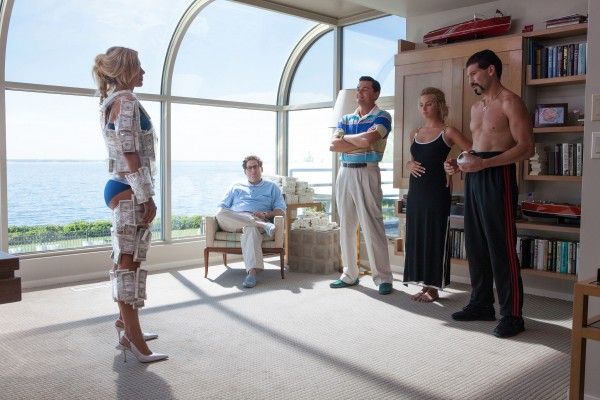 Emma, because you’ve produced more work with Marty, you were a bit of a liaison between the new guys and the whole production. Do you want to speak to that a little? EMMA TILLINGER KOSKOFF: I have had the great privilege of working with Marty for many, many years and really, as soon as Riza and Joey, once it all came together and they said we’re off to the races, it was really where I kicked into high gear and helped put together an ace New York production team. The script was influx, everyday we were met with new challenges that these guys didn’t bat an eye to, and it was a very challenging but fun experience and we all couldn’t have done it without them. Leo was amazing, Marty, everyone just got down and dirty and went for it. Marty, I heard a rumor that you’re going to retire. Is that true? And I also heard there were cuts made to avoid an NC-17 rating.SCORSESE: You’ll have to stop me yourself. You’ll have to just tackle me to stop me. For Leo, you’re walking with a cane today and I wondered if it was the role that put you over. And I understand that there’s a scene with a candle in the movie. You were really giving your all for your art in a way that nobody’s ever seen before. Can you talk about that?DICAPRIO: The cane is because I sprained my ankle on a floorboard. Nothing as exciting as maybe you hoped it would be. But yes, look, my attitude about doing this movie is we were trying to depict a modern day Caligula and all the debauchery that comes with it so you detach yourself from your own individuality for the accurate portrayal of a character. That’s what we do, so all the stuff that came with it, you know, it was a fun process because there was really no limits to what we could do because Jordan’s biography depicted stuff that we could have never imagined and Terry captured it all from the novel.    SCORSESE: There’s much more in there, of course. In terms of the candle thing, the idea is his wife is really mad at him, she’s very angry, and he’s denying even knowing where he was, what he was doing and so then we show you what he was doing, and he says, ‘Oh, yes!’ [Laughs] ‘Oh, yeah, no. I remember now!’ [Laughs] It’s rather extreme. That means he was really, really out of it in a way and it’s part of the humor of it in a way. It’s in the book. And as far as our trims with the MPAA, actually, it went rather smoothly, and as you know I’ve been dealing with that system since 1973, Mean Streets, where I had to cut a few lines of dialogue that are now used on regular newscasts and every other word in British newspapers. You know, it was 40 years ago. And so we just worked with them. It got a little difficult because of the time limit. I had to decide which frames, which scenes and I also had to finish the cut of the film and that became rather pressured in a way, but we finally worked it out. Nothing that I would feel in any way I missed.Â
Emma, because you’ve produced more work with Marty, you were a bit of a liaison between the new guys and the whole production. Do you want to speak to that a little? EMMA TILLINGER KOSKOFF: I have had the great privilege of working with Marty for many, many years and really, as soon as Riza and Joey, once it all came together and they said we’re off to the races, it was really where I kicked into high gear and helped put together an ace New York production team. The script was influx, everyday we were met with new challenges that these guys didn’t bat an eye to, and it was a very challenging but fun experience and we all couldn’t have done it without them. Leo was amazing, Marty, everyone just got down and dirty and went for it. Marty, I heard a rumor that you’re going to retire. Is that true? And I also heard there were cuts made to avoid an NC-17 rating.SCORSESE: You’ll have to stop me yourself. You’ll have to just tackle me to stop me. For Leo, you’re walking with a cane today and I wondered if it was the role that put you over. And I understand that there’s a scene with a candle in the movie. You were really giving your all for your art in a way that nobody’s ever seen before. Can you talk about that?DICAPRIO: The cane is because I sprained my ankle on a floorboard. Nothing as exciting as maybe you hoped it would be. But yes, look, my attitude about doing this movie is we were trying to depict a modern day Caligula and all the debauchery that comes with it so you detach yourself from your own individuality for the accurate portrayal of a character. That’s what we do, so all the stuff that came with it, you know, it was a fun process because there was really no limits to what we could do because Jordan’s biography depicted stuff that we could have never imagined and Terry captured it all from the novel.    SCORSESE: There’s much more in there, of course. In terms of the candle thing, the idea is his wife is really mad at him, she’s very angry, and he’s denying even knowing where he was, what he was doing and so then we show you what he was doing, and he says, ‘Oh, yes!’ [Laughs] ‘Oh, yeah, no. I remember now!’ [Laughs] It’s rather extreme. That means he was really, really out of it in a way and it’s part of the humor of it in a way. It’s in the book. And as far as our trims with the MPAA, actually, it went rather smoothly, and as you know I’ve been dealing with that system since 1973, Mean Streets, where I had to cut a few lines of dialogue that are now used on regular newscasts and every other word in British newspapers. You know, it was 40 years ago. And so we just worked with them. It got a little difficult because of the time limit. I had to decide which frames, which scenes and I also had to finish the cut of the film and that became rather pressured in a way, but we finally worked it out. Nothing that I would feel in any way I missed. 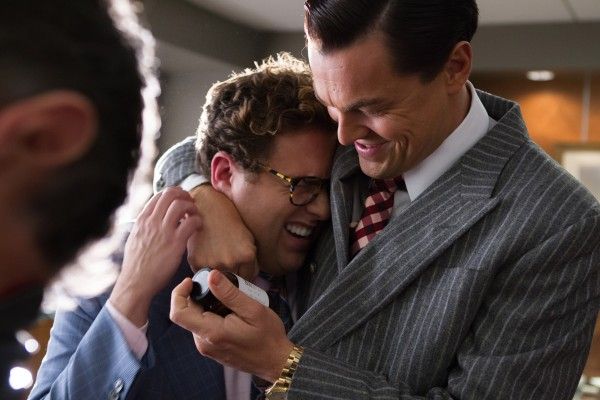 I’ve always wondered when an actor has to do a cocaine sequence in a film, I know it’s not really cocaine, but if the shot is showing it going up your nose, what are you actually using?DICAPRIO: It’s baby vitamins. SCORSESE: Yes, it helped them. DICAPRIO: Vitamin B. It certainly burned our noses and we were energized for the day. [Laughs] Did you have to do multiple takes?DICAPRIO: Yeah, a lot of it. Yeah, we did a lot of it in this. Rob, you’re more into directing nowadays than performing, so I’m wondering how you were approached, why you were approached and what made you take the part.ROB REINER: I don’t know why I was approach. You have to ask Marty about that, but I can tell you that when Martin Scorsese calls to ask you to be in a movie, you just do it. You don’t ask questions. You just do it. He’s one of the greatest filmmakers of all time and when I got the chance, first of all I thought, he wants me to play Leonardo DiCaprio’s father so I thought, well, maybe I’m a lot more handsome than I think. I took it to mean that. But when you go into a situation, I mean, Marty and Leo have worked together on five movies I think now and so they have a shorthand. They’re like family to each other, you know? So it’s always interesting when you’re an actor coming into a situation like this, you don’t know. How are you gonna fit in? And the thing that was such a pleasure for me is that Marty and Leo both make you feel right away at home. You never know as a director what other directors do, you know? Because you don’t get to see what they do. Aside from the fact that [Marty] is one of the great filmmakers of all time and he knows how to use a camera better than anybody, he does the one thing that every director should always try to do, which is he sets a tone and he makes a playground where you can do your best work. And the one thing I did take away from it is, and Marty’s done this so well - he did it in Raging Bull, he’s done it in Taxi Driver, he did it in Aviator, he’s done it many times - he will make the character the story. He is not in a traditional way constructing stories with plot devices and things that go like that. And I do those! Even though I do a lot of character driven movies, I’m kind of married to those kinds of things and what I learned is that he’s gutty. He’s out there on an edge and that’s a good thing because what he does is he lets the characters be the story and in the case of Jordan Belfort, he is the epitome of everything that was bad about deregulated Wall Street. If you’re gonna let the character be the story, you better set a tone that allows the actors to do the best work they can do and so we were allowed to improvise, we were allowed to find things because Marty knows that when an improvised moment comes out of a real situation, it’s gonna have more life and more going on than anything you can imagine and that’s how the character can become the story, so I watched him do that. It was a great, all-time experience for me.Â
I’ve always wondered when an actor has to do a cocaine sequence in a film, I know it’s not really cocaine, but if the shot is showing it going up your nose, what are you actually using?DICAPRIO: It’s baby vitamins. SCORSESE: Yes, it helped them. DICAPRIO: Vitamin B. It certainly burned our noses and we were energized for the day. [Laughs] Did you have to do multiple takes?DICAPRIO: Yeah, a lot of it. Yeah, we did a lot of it in this. Rob, you’re more into directing nowadays than performing, so I’m wondering how you were approached, why you were approached and what made you take the part.ROB REINER: I don’t know why I was approach. You have to ask Marty about that, but I can tell you that when Martin Scorsese calls to ask you to be in a movie, you just do it. You don’t ask questions. You just do it. He’s one of the greatest filmmakers of all time and when I got the chance, first of all I thought, he wants me to play Leonardo DiCaprio’s father so I thought, well, maybe I’m a lot more handsome than I think. I took it to mean that. But when you go into a situation, I mean, Marty and Leo have worked together on five movies I think now and so they have a shorthand. They’re like family to each other, you know? So it’s always interesting when you’re an actor coming into a situation like this, you don’t know. How are you gonna fit in? And the thing that was such a pleasure for me is that Marty and Leo both make you feel right away at home. You never know as a director what other directors do, you know? Because you don’t get to see what they do. Aside from the fact that [Marty] is one of the great filmmakers of all time and he knows how to use a camera better than anybody, he does the one thing that every director should always try to do, which is he sets a tone and he makes a playground where you can do your best work. And the one thing I did take away from it is, and Marty’s done this so well - he did it in Raging Bull, he’s done it in Taxi Driver, he did it in Aviator, he’s done it many times - he will make the character the story. He is not in a traditional way constructing stories with plot devices and things that go like that. And I do those! Even though I do a lot of character driven movies, I’m kind of married to those kinds of things and what I learned is that he’s gutty. He’s out there on an edge and that’s a good thing because what he does is he lets the characters be the story and in the case of Jordan Belfort, he is the epitome of everything that was bad about deregulated Wall Street. If you’re gonna let the character be the story, you better set a tone that allows the actors to do the best work they can do and so we were allowed to improvise, we were allowed to find things because Marty knows that when an improvised moment comes out of a real situation, it’s gonna have more life and more going on than anything you can imagine and that’s how the character can become the story, so I watched him do that. It was a great, all-time experience for me.Â
WOLF OF WALL STREET Interview
continued on Page 2
KYLE CHANDLER: It was everything that [Rob] just said. A lot of the things you just said I've been saying the same things in interviews. When you get a call from one of the people you look up to in the industry, two of the people, you don't say no. But the most exciting thing for me going into this was when we first met, me being able to say, ‘Do I get to meet this guy?’ For me that was the most joyous thing because, yes, you're gonna meet “the guy.†Because then you get to go into the part with the real thing. But the most enjoyable thing was, as you were saying, for the actor, is going in with people who do the creative atmosphere. I'm sitting at this table up here, but that first day of shooting on the boat, I was a little tense. I was only tense for about five minutes because [to Martin Scorsese] you make it so easy and you do create that atmosphere and [to Leonardo DiCaprio] you were so wonderful because you set the tone. The lead actor on the set sets that tone. You gave that to the actors. The experience as a whole was just absolutely incredible.Â
ROB REINER: I got to say the “F†word in a Martin Scorsese picture, so that's always a good thing.Â
Why do you think audiences love these characters and make them celebrities? Do you think it’s because we're a depraved society?
LEONARDO DICAPRIO: Some of my favorite films of all time have been a reflection of the darker side of human nature. In a way, those films are an accurate portrayal of humanity, not all humanity, but a facet of who we are today. I wanted to do a film that to me was a depiction of what I felt like are the times that we live in. Jordan Belfort to me was somebody that not only was I obsessed with playing since 2008, watching the destruction of our economy, he's not the problem, but he represents something within our very nature, and something within our society that is very wrong. You can point those attributes to literally everything that's going on in our world today. It's something I just felt compelled to play, and whether we're making these people celebrities or not, or bringing too much attention to them, that's all in the eye of the beholder in my opinion. I think it's important to do films like this, ultimately.
These characters are scumbags, but it's usually street scumbags or gangsters. It seems like there's more honor amongst thieves within that brethren. On Wall Street, these guys are truly despicable. Can you talk about that dichotomy?
MARTIN SCORSESE: Well, they're respectable. They have the veneer of respectability. I don't say all of them are, in terms of being negative people. Terry, remember you said - what committee was [Bernie] Madoff on?Â
TERENCE WINTER: He was the Chairman of the National Association of Securities Dealers who, when Jordan was arrested in the late 90s, came out and railed against him saying, ‘This guy’s the reason Wall Street has a black eye. People like Jordan Belfort should go to jail forever.’ This was Bernie Madoff.Â
MARTIN SCORSESE: That's a good answer. I also think there is a kind of mythology about the honor among thieves to a certain extent. Goodfellas shows it - maybe not. I guess it's more a primal level in the street. You promise something to somebody, you have a situation where it's a matter of respecting each other. It's different; it's face to face. These people, no one knows where the hand comes from. They're doing it with the stroke of a pen. It's more insidious, I think.Â
LEONARDO DICAPRIO: Interestingly enough, not knowing a lot about the world of finance or Wall Street going into this, what I quickly realized is these weren't the fat cats destroying our economy. These were the street urchins. These were the guys from the underworld that were trying to create a little island and emulate Gordon Gekko. They were trying to be the guys that were simultaneously robbing our country of billions and billions of dollars. They represented an attitude more than anything.Â
Is there anything in this film that's a reflection of the impact of the bankers who now call the shots in Hollywood rather than the studio heads?
MARTIN SCORSESE: I don't really know who's calling the shots anymore. Seriously. I don't know. All I know is that the cinema we know and the cinema we took seriously when I was growing up and making films earlier, it's all changed now, particularly with a marketplace like this. Leo said, we had an opportunity here from Red Granite to make something that can take a risk in a sensible way. It just appears to me, and I'm 71 now, being aware, maybe not understanding, but aware of America since the early 50s, there's a change. Everything is about where the money is.Â
ROB REINER: I admire you so much because you are 71 and I don't know where the power is either. I've been doing it for a long time now, but in that you are still able to try to realize your art. We, as filmmakers, we just want to make something and so you find any way you can to do it and I don't know where the money comes from. They're Russian oligarchs! I don't know who they are! We just keep trying and I admire you so much because you keep trying. It's so easy to fall back into, ‘Well, we'll do foreign pre-sales and you'll patch this together.’ But to start with something organic, with Terence's script and the book and Leo's vision and your vision, to start and do something in an organic way is rare now. If it's not a movie that doesn't have either “man†in the title or a number - Iron Man 2, Superman 3, Batman 4, Spider-Man 3. A “man†and number! If you don't have that, for you to keep doing it, I can't tell you how much I admire you for it.Â
What was the most important thing you learned from Jordan Belfort and do you have empathy or sympathy for him now?
LEONARDO DICAPRIO: He was incredibly beneficial for me as an actor. I'd been having conversations with him off and on for years. You have to understand, he looks at this as an isolated period in his life and he's been paying the price ever since. He's been doing everything he can to repay his debt to everybody he ripped off. He's since been trying to lead his life in a very respectable way. As a resource, for me, he was incredibly beneficial. He would divulge the most embarrassing things about his life because he looked at it as a part of his past. Even times where we'd start to have conversations where he'd start to veer off into, ‘Well, maybe we shouldn't portray...’ I'd say, ‘Look, you wrote this book. You wrote this book about this time period in your life and you did it for a reason, and you did it to talk about what happened behind the doors of Wall Street and the conversations that were going on in an unregulated marketplace. You're making a statement here, so let's tell the truth.’ As soon as we had that conversation, he was like, ‘Alright, I'm an open book. I’m gonna tell you not only what happened on that day, I'm gonna tell you something that was ten times worse.’ I think from Marty's perspective he wanted to have some distance from [Jordan] just to be able to have a perspective, so I was in a lot of ways the middle man that would bring a lot of information from what I heard from Jordan to Marty and sometimes it would result in, ‘Can we get this set piece tomorrow? Can we get an animal on set? Jordan said that this was happening,’ and our great team over here would provide that. But it was a very free-formed endeavor in that regard.
MARTIN SCORSESE: I did the same with Henry Hill. I never met him. I spoke to him once on the phone and that was it. They're very persuasive. You'd be surprised. I just need to find my own way, but then I've got Leo, Terry, everybody here, we're working all together, and the actors. I've got to find my own way with it. They're fascinating. That's what's so fascinating about them, they can be persuasive.Â
One of the funniest scenes is the Quaalude overdose. What was it like shooting that scene and did anything funny happen while you were doing it?
LEONARDO DICAPRIO: A funny thing that happened? I think everything! Terry and I talked a lot about what we wanted this whole film to feel like early on. We wanted it to be this hallucinogenic ride, this roller coaster, and that sequence specifically was like a day in the life of two schnooks that took way too many drugs. Through some of the rehearsal period we talked about adding more tension to that and condensing a few scenes to create the urgency of him coming back to Donnie who had given him the drugs as an apology for screwing up, and then he's on the phone with Switzerland. To me, it was almost like a small film within the film and we kind of treated it that way.
Did you do the stunt?
LEONARDO DICAPRIO: Did I do the stunt? I don’t know if I did that thing.Â
MARTIN SCORSESE: Rolling down the stairs? No.Â
LEONARDO DICAPRIO: I did do everything else though, and I did have injuries if it's worth anything. A lot of it came from me really filming Jordan, talking to me about what Quaaludes were like. I had him rolling around on the floor for me and he was very helpful with that, but a lot of the research that I did really came from watching this one video on loop, it's on YouTube, it’s called “The Drunkest Man In The World†and it's a man trying to get a beer, but he's rolling around the floor for hours. That was a huge inspiration for me.Â
MARTIN SCORSESE: For example, when he crawls, the idea, besides Bo Dietl not understanding him on the telephone, is a key line. It’s a key moment when the drugs kick in. Under those circumstances, you think you're sane. You do think you’re saying what you're supposed to be saying, and you're not. The organs and the mouth, they aren't working. You can't get the signal. It just doesn't go the direction. Nothing goes. [Laughs] The funniest part for me is when he finally crawls out, and you see now he’s gonna get in the car and the car is over here and he's here - and silence. Then he crawls out, falls down, but the crawling is really interesting because I had forgotten that the door of that Lamborghini opened up. [Leo] said, ‘What am I gonna do?’ I said, ‘Try your legs! I don't know!’ ‘Should I try my foot?’ I said, ‘It'll take hours if it's your foot!’ But that’s how we wound up doing it, just like Jerry Lewis or Jacques Tati with body language. Then the phone call.Â
LEONARDO DICAPRIO: It's great the way you hold that one frame.Â
ROB REINER: I put it up with the best comedy scenes I've ever seen in a movie in my life, and what makes it good is that they took their time with it. They didn't rush it, every moment, and because you take your time it just gets funnier and funnier and funnier. I was stunned at how physically great [Leo was].Â
Mr. Scorsese, in James Toback's documentary Seduced and Abandoned, you said that you realized all of your films had to do with an obligation to the brother, and you specifically cite your father's relationship to his brother. Does this connect to Donnie and Jordan in the movie? Also, to you and Leonardo, would you categorize your relationship as brotherly, friendly, or father-son?
MARTIN SCORSESE: So let me see if I got that right; that's a three-part question? [Laughs] The first one is yeah, I think a lot of it has to do with obligation and responsibility. I’m my brother's keeper. When there's no restraint, do you have the responsibility? What happens to your responsibility ultimately when there's no moral restraint? That's Mean Streets, it's the same picture it turns out. That's one of the reasons it took me a while to get into it. We started building up the Donnie thing even more. I saw them. I saw over the years very, very personally devastating relationships fall apart, trying to hold themselves together, dying within six moths of each other. They're still tied together on this blood level. That certainly has been something throughout every one of the films I've made, more or less.Â
LEONARDO DICAPRIO: I can answer it just from my perspective. With Gangs Of New York, I'd been wanting to work with this man for a long period of time. I remember my father taking me to see one of Marty's movies and saying, ‘If you have an opportunity and if you have a green light in this industry, there's one person you should work with - this man.’ I sought out trying to work with him and it culminated in Gangs Of New York and since then, it's been this great relationship where we've trusted each other more and more. We've realized we have a lot of similar sensibilities in the types of movies that we want to do and we have an acute understanding for what a scene should be. A lot of times it's unspoken. More than that, everyday for me, it's just an honor to be on set with somebody like this. He reinforces in you what making movies is all about. Sometimes you forget. Sometimes people say things and you can go off on different diversions, but a couple things he just said to me on this film, it's always a learning experience. We're doing a film about pretty disreputable, despicable people and we had a lot of conversations about, ‘Okay, will audiences go along on the journey with us,’ and he said one thing to me that I'll never forget. It was my mantra through this film. He said, ‘Look, as long as you portray these people for what they are, you don't try to sugarcoat them, apologize for their actions or depict them in any way other than authentically what they are, audiences will go along with you.’ That was like the green light for this entire process and it's a great mantra for making movies in general. And as far as our relationship, he's a mentor to me and I learn so much every time I'm on set with him. It’s amazing.Â
MARTIN SCORSESE: Thank you, Leo. The element there is trust, creative trust. It's been remarkable in the later part of my life to find someone I can collaborate with who rejuvenates me every time. Someone says, ‘Oh, I want to do this picture,’ or, ‘Oh, I want to do that,’ … sometimes I feel over the years the pictures that I’ve made and the others I didn't have an affinity to immediately are the ones [where] they knew more than me what I was right for. But in any event, it has to do with trust. If I talk to him that way and he accepts it, he knows where he's going. It isn't a matter of every day having to say that. If it's every day, then we can't make the picture.Â
The Wolf of Wall Street arrives in theaters nationwide on Wednesday, December 25th.

